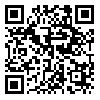Preventive Care in Nursing and Midwifery Journal
BibTeX | RIS | EndNote | Medlars | ProCite | Reference Manager | RefWorks
Send citation to:
URL: http://nmcjournal.zums.ac.ir/article-1-415-en.html
Background and Objectives: Anxiety is one of the most common psychological reactions in patients with acute myocardial infarction. This study aimed to compare the effect of training by peers and nurses on anxiety in patients with acute myocardial infarction.
Materials and Methods: This study is a quasi-experimental intervention. Samples included 60 patients with myocardial infarction who were divided randomly into control and intervention groups. The first group was taught by peers, the second by nurses. Rate of anxiety was evaluated in both groups through the completion of the Spielberger anxiety questionnaire before the intervention, immediately after the intervention, five days after heart attack, and four weeks after the heart attack. Data were analyzed through independent t-test, chi-square test, Fisher's exact test and two-way ANOVA with repeated measures.
Results: The mean difference of anxiety in both groups three days after the heart attack (before the intervention) was not statistically significant (p=0.76). A two-way analysis of variance with repeated measures showed that the level of anxiety in both groups three days after the heart attack (immediately after the intervention), five days and one month after it (after intervention) was statistically significant (p<0.0001)
Conclusion: Peer-led education compared with education by nurses significantly reduced anxiety level in patients with myocardial infarction. Therefore, using this method is recommended in patients with myocardial infarction.
Received: 2016/06/22 | Accepted: 2016/11/13 | Published: 2016/11/13
| Rights and permissions | |
 |
This work is licensed under a Creative Commons Attribution-NonCommercial 4.0 International License. |



